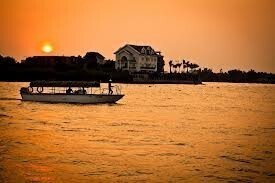Chapter 1: The Odyssey
An excerptMy last glimpse of the jewel city of Saigon in 1975 was by the light of bombardment. During the night of April 29 the army of North Vietnam had reached the outskirts of the city and begun hammering Tan Son Nhat airport with rocket and mortar fire. The staccato lights of hundreds of shell bursts flashed through the darkness, ripping the night to shreds and illuminating brief, ragged images of the skyline. The ground rumbled like kettledrums. We huddled under steel helmets and waited, and watched. The next day the enemy would gain most of the city, and by dark the nation. And a long darkness it would be for beautiful Saigon.
For the next decade and more Vietnam would turn in upon herself, refusing commerce with the outside world. The rulers of the newly unified nation would throw a cloak of silence over the land, so that the only voice we heard from it were those of the fleeing boat people. Vietnam was going into hiding.
As for me, leaving the mouth of the Mekong River behind in the last hours of the war I bitterly cursed the enemy and I even cursed the land. I cursed the war and defeat and all the politicians and generals on either side. I swore I would never return. Though veterans often visit their old battlefields later in life, I vowed I would not. I would leave behind forever the land I had come to both love and hate.
But while I might leave Vietnam, she would not leave me. For nearly two decades the Land of the Ascending Dragon invaded my dreams. I awoke from them with the stink of cordite in my nostrils and cries in my ears. A friend told me that I sometimes walked in my sleep, uttering Vietnamese words that had long faded from my conscious memory. In the town where I lived Vietnamese restaurants sent their culinary siren call wafting through the streets, never letting me forget. They awakened a thousand sensual memories of the living fragrance of chile and the florid bouquet of lemon grass and garlic; of the streets of Saigon aclatter and asizzle with the joyful, orderly chaos of cookery; of steam billowing from little noodle shops and the taste of life eagerly lived in the face of a cruel war.
In the fullness of time the government of Vietnam had decided that they were foolish to hold the world at arm's length, and by degrees began to ease travel restrictions. For my part, I had walked Vietnam in my sleep for too long. And for a man whose life is so much a pursuit of the savory and the sweet, bitterness can have only its portion and no more; balance must be observed. Finally, I had a great lack to fill: the distractions of war had made it impossible for me to explore the culture and cuisine of Vietnam as thoroughly as I would have liked. My daily fare had been C-rations and mess hall chow, interspersed with occasional culinary bliss in the city. This time I was determined that I would eat my way through the whole country. From Saigon in the south to Hanoi in the north I would rediscover Vietnam in a gastronomic tour de force, my only weapons being knife, fork and chop sticks.
I did not return to Vietnam without some trepidation. Though it had been a place of the most bewitching loveliness it was there that the ugliest scenes of my life had been played out. Amid culture, refinement and delicacy, cruelty had been a fact of daily life. Now as I returned I was hopeful with anticipation and yet full of foreboding. I knew that each pleasure I might find could cost me a pain. But I was sure that, unless things had changed very remarkably, the pleasures would outweigh the pains by just enough.
This is an excerpt. Read the full story in Saigon, Saigon.
